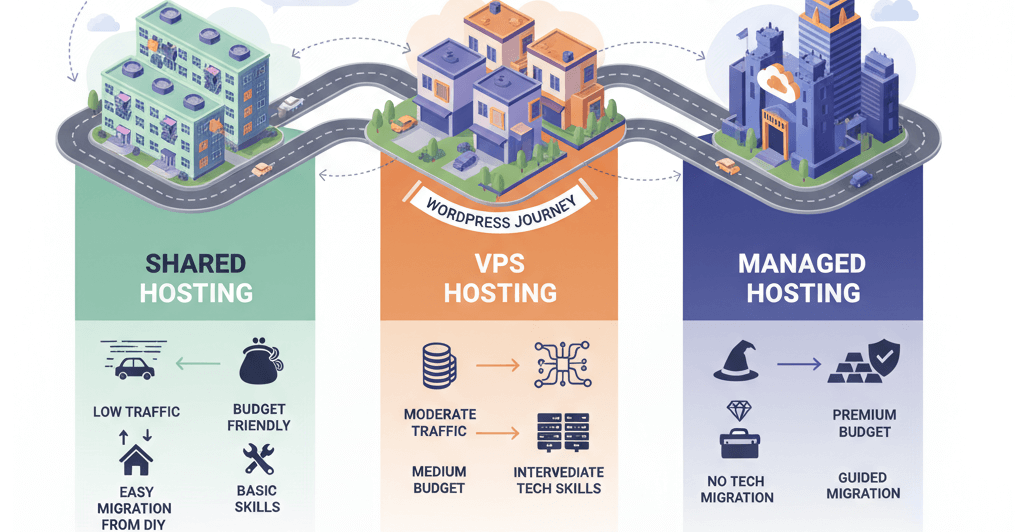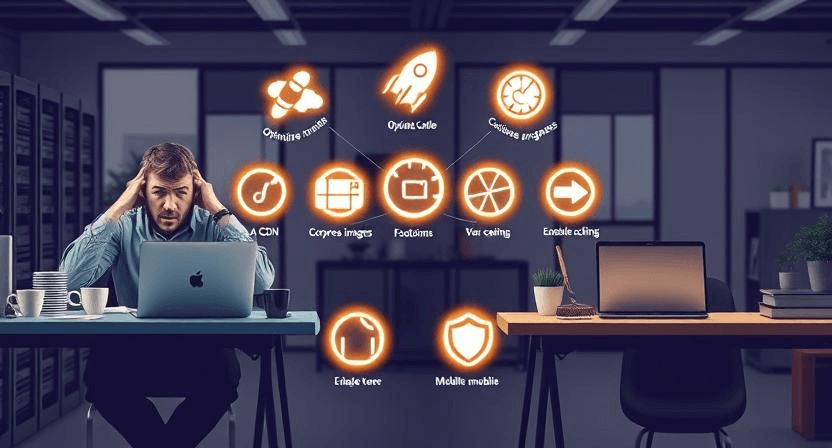When Should You Hire a Website Repair Expert?

As a website owner, it's natural to try and troubleshoot minor issues yourself. However, there comes a point when a DIY approach can lead to more harm than good, consuming valuable time, increasing frustration, and potentially causing further damage to your online presence. Recognizing when to call in a website repair expert is crucial for minimizing downtime, protecting your data, and ensuring the long-term health of your site. This guide outlines the key signs that indicate it's time to hire a professional to fix your website.
Understanding the Value of a Website Repair Expert
A website repair expert brings specialized knowledge, advanced tools, and years of experience to the table. They can quickly diagnose complex problems, implement effective solutions, and proactively prevent future issues. Hiring an expert is often an investment that saves you time, money, and stress in the long run, especially when dealing with critical website malfunctions.
Signs You Need Professional Help
Here are common scenarios where professional intervention becomes highly recommended:
1. Your Website is Down or Unresponsive
The Sign: Your website displays a "500 Internal Server Error," "404 Not Found" on critical pages, or simply doesn't load at all. Visitors are greeted with blank screens or error messages instead of your content.
Why You Need an Expert: While some downtime issues like a 500 error can be diagnosed with our how to troubleshoot a "500 Internal Server Error" guide, persistent or complete outages often stem from complex server configurations, critical database issues, or deep-seated code conflicts that are beyond basic troubleshooting. Every minute your site is down means lost business and a damaged reputation. Experts can quickly pinpoint the root cause (e.g., server issues, corrupted core files, database connection problems) and implement fixes to restore your site rapidly. They also know what to do when your web server goes down.
Step-by-Step for This Sign:
- Initial Check: Verify if the site is down for everyone (e.g., using a site like Down For Everyone Or Just Me).
- Browser Console: Open your browser's developer console (F12 or Cmd+Option+I) to look for network errors or specific status codes like 404 or 500.
- Hosting Status: Check your hosting provider's status page for known outages.
- Basic Troubleshooting: Try clearing your browser cache, check your internet connection, and then verify your domain's DNS settings (using a tool like DNS Checker).
- Contact Host (if server issue): If the issue appears server-related, contact your host.
- Escalate to Expert: If the host confirms no server-side issues on their end, or if you're unable to diagnose or fix it after basic checks, it's time for an expert. They can delve into server logs, database integrity, and core application files to resolve complex issues like database connection errors.
2. Your Website Has Been Hacked or Infected with Malware
The Sign: Your website is redirecting to spam sites, displaying "Dangerous Site" warnings in browsers, sending out spam emails, or you've found suspicious files or unknown user accounts. This is a common issue discussed in our how to fix a hacked website guide.
Why You Need an Expert: Malware removal is a delicate and complex process. Inexperienced attempts can lead to data loss, incomplete cleanup (resulting in reinfection), or even breaking your website entirely. Experts possess specialized tools and knowledge to:
- Identify all infected files and database entries.
- Completely remove malicious code without damaging your site.
- Patch the vulnerabilities that led to the hack.
- Reinforce your site's security to prevent future attacks, as detailed in how to protect against hacks and recover from security breaches.
- Assist with getting "Dangerous Site" warnings removed, as covered in how to remove dangerous site warnings.
Step-by-Step for This Sign:
- Verify the Hack: Check Google Search Console's "Security Issues" report for official notifications. Use online scanners (e.g., Sucuri SiteCheck) for an initial assessment.
- Isolate (if possible): If your host provides a staging environment, try to make a copy there for analysis.
- Avoid Immediate Manual Deletion: Resist the urge to randomly delete files unless you are certain they are malware and understand the impact. Incomplete removal often leads to reinfection.
- Change Passwords: Change all website-related passwords (FTP, database, CMS admin, hosting account) immediately.
- Contact Host: Inform your hosting provider, as they may have server-side scans or block lists.
- Hire Expert: This is a prime example of when you absolutely need a professional. They will perform a thorough malware cleanup, vulnerability assessment, and security hardening, including specific steps for WordPress malware removal.
3. Persistent Performance Issues
The Sign: Your website loads consistently slow, experiences frequent timeouts, or lags significantly when users interact with it. Your Google PageSpeed Insights scores are consistently low. This aligns with issues discussed in why your website is so slow.
Why You Need an Expert: Slow website performance can be a multifaceted problem, often involving complex interactions between server configurations, bloated databases, unoptimized code, heavy images, and inefficient caching. While simple fixes are covered in our steps to speed up your site, identifying the root cause of persistent slowness requires in-depth analysis. Experts can:
- Perform comprehensive performance audits.
- Optimize server settings, database queries, and code.
- Implement advanced caching strategies and CDN configurations.
- Identify resource-intensive plugins or themes that are slowing down your site, as discussed in how to fix slow website performance.
Step-by-Step for This Sign:
- Verify Slowness: Use tools like GTmetrix or Google PageSpeed Insights to confirm slowness and get initial recommendations.
- Basic Caching: Ensure you have a caching plugin configured (if using a CMS).
- Image Optimization: Compress and optimize all images.
- Host Consultation: Ask your host if there are server-side issues or if you're on an inadequate hosting plan.
- Hire Expert: If basic optimizations don't yield significant results, a performance expert can dive deep into code, database, and server configurations to find and resolve complex bottlenecks.
4. Broken Functionality After Updates or Changes
The Sign: Your contact form stops working, your e-commerce checkout process fails, images aren't loading correctly, or a critical plugin breaks after you've updated your CMS, theme, or other plugins. This is especially relevant to how to update your website without breaking it.
Why You Need an Expert: Software updates, while essential for security and performance, can sometimes introduce compatibility conflicts. Diagnosing these conflicts, especially across multiple plugins or a custom theme, can be time-consuming and technically challenging. Experts can:
- Identify the exact plugin, theme, or code conflict causing the issue.
- Safely revert changes or apply specific patches to resolve the incompatibility.
- Debug JavaScript or CSS issues that lead to broken layouts, as detailed in why your website layout is broken.
- Fix specific issues like contact forms not working or e-commerce payment processing failures.
- Troubleshoot images not loading or other asset display issues.
Step-by-Step for This Sign:
- Revert Latest Change: If you know what you just updated, try reverting to a previous version (from a backup) or temporarily deactivating the problematic plugin/theme.
- Plugin/Theme Conflict Check: Deactivate all plugins/themes (except core ones) and reactivate them one by one to find the culprit.
- Browser Console Check: Look for JavaScript errors (for functionality issues) or 404 errors (for missing assets like images).
- Hire Expert: If deactivating components doesn't solve it, or if the issue persists with custom code, an expert can perform a deeper debug.
5. You Lack the Time, Expertise, or Confidence
The Sign: You're overwhelmed by technical jargon, don't have the time to dedicate to troubleshooting, or simply lack the confidence to make critical changes to your website without fear of breaking it further.
Why You Need an Expert: Your time is valuable. Trying to fix complex website issues yourself when you lack the necessary skills can be incredibly inefficient and stressful. A professional website repair service allows you to:
- Focus on your core business activities.
- Ensure the problem is fixed correctly and efficiently the first time.
- Gain peace of mind knowing your website is in capable hands.
- Receive ongoing support and preventative maintenance, reducing the cost of ignoring website issues.
Step-by-Step for This Sign:
- Assess Your Resources: Honestly evaluate your technical skills, available time, and patience level for complex troubleshooting.
- Consider the Risk: What's the potential cost of prolonged downtime or a botched DIY fix to your business?
- Research Experts: Look for website repair services with good reviews, clear pricing, and relevant experience.
- Get a Quote: Contact potential experts to discuss your issue and get a clear understanding of their approach and costs.
- Hire an Expert: If the benefits outweigh the costs and you're confident in their abilities, delegate the task.
Knowing when to delegate is a sign of smart business management. While minor tweaks and regular maintenance (like the 5 must-do website maintenance tasks every month) can be handled in-house, complex or persistent website issues are best left to the professionals. Don't let website problems escalate and harm your business. If you recognize any of these signs, don't hesitate to contact WebCareSG for prompt, reliable, and expert website repair services.
Related WebCare Solutions
Google Ads Conversions Not Tracking? How to Fix (Step-by-Step)
A detailed guide to troubleshooting and fixing Google Ads conversion tracking issues, covering missing conversion codes, Google Tag Manager setup errors, and thank-you page triggers.
Choose the Right WordPress Hosting Plan: Shared vs VPS vs Managed
Practical guidance to match hosting types with site traffic, budget, and technical needs — plus migration tips.
Why is My Website So Slow? 7 Ways to Speed It Up
Discover 7 effective strategies to speed up your slow website, from optimizing images and enabling caching to minimizing code and improving server response time.
Ready to get started?
Focus on your business while we fix your website. Contact WebCareSG today for fast, reliable solutions!
Whatsapp us on

